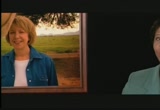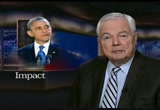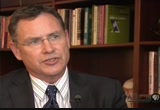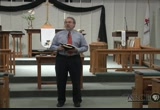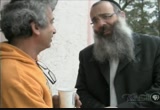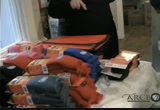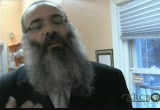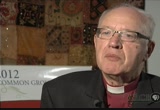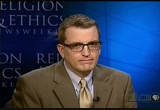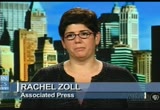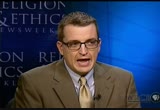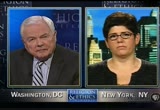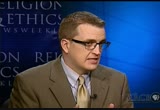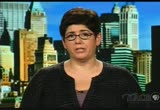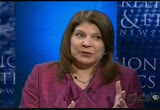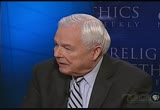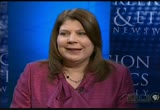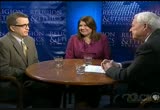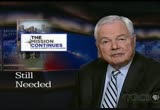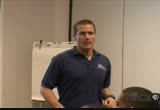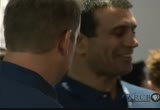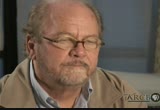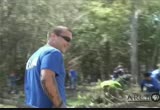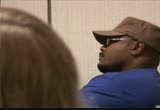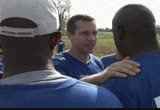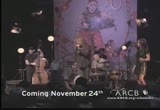tv Religion Ethics Newsweekly PBS November 11, 2012 10:00am-10:30am PST
10:00 am
10:01 am
>> wcome, i'bob erney. it's good to have you with us. like many others in the nation, faith groups are assessing the impact of this week's election. according to exit polls, president obama won a slight majority of catholic voters overall, thanks largely to strong support from latino catholics. mitt romney won the white catholic vote by an almost 20-point margin. almost 80% of evangelicals who voted voted for romney. black protestants went overwhelmingly for obama, as did the vast majority of jews. but the biggest share of obama's faith coalition was voters who
10:02 am
say they aren't affiliated with any religion. steve schneck was co-chair of catholics for obama. he says while issues like abortion, religious liberty and gay marriage were important, in the end, it was the economy that tipped the scale for the president. >> all of these religious issues, while they are important to religious voters, i think, even among religious voters, they ranked these issues a little further down on the spectrum. >> ralph reed of the faith and freedom coalition admitted that a massive mobilization among religious conservatives wasn't enough to offset the number of women, young people and minorities who voted democratic. >> i think we need to do a better job of not looking like, you know, your daddy's religious right. you know we have to be as a movement younger. we have to be more diverse ethnically.
10:03 am
>> voters also decided several key ballot initiatives. for the first time ever, measures to approve same-sex marriage passed by referendum in maine, maryland and washington state. and voters in minnesota rejected a proposed constitutional ban on gay marriage. in massachusetts, a measure to legalize physician-assisted suicide was narrowly defeated. in california, voters decided not to abolish the death penalty. with all the acrimony around the election, many religious leaders called for a new spirit of civility. more than 700 churches held special election day communion services. organizers said they wanted to refocus allegiance to god and work for justice beyond the ballot box. our assessment of the election returns in a few moments. faith-based groups continue to mobilize to help those affected by hurricane sandy. on the east coast, volunteers
10:04 am
across the spectrum are serving food, providing shelter and helping with cleanup in a massive relief operation. this week, ny othose forts we hampereby evn mo bad weather. kim lawton has more on the efforts in one new york community. >> a week after sandy, rabbi shneur wolowik of the chabad lubavitch movement is in the devastated rockaway beach area of new york. he's visiting some of the many families in his congregation whose homes are unlivable. when sandy hit, this family awoke to the sound of water rushing in. >> where were you at the time? >> i was in bed and then i heard the back door sprang open from the force of the water from the lake. it filled up the steps from the basement and after it got to a certain level, it just knocked the door right out. >> wolowik is director of the chabad center of the five towns in cedarhurst. he says the needs in his community are overwhelming.
10:05 am
>> we find ourselves in an unprecedented and historical hurricane which uprooted hundreds of people, their homes, their belongings, their lives, their valuables. >at the chabad center, the rabbi's wife connie is organizing and passing out supplies, such as space age blankets for families that haven't had electricity since the storm. >> you put these over you and then you wrap yourself. >> there are also hand warmers and socks to help take the edge off the cold. volunteers are making deliveries for those who can't get to the center. these volunteers are going in a car, packed with blankets, and hot food, gloves, warmers. they're knocking house to house on damaged homes, finding out if they need anything. th center has been providing up to 2,000 meals every day. >> it's a lifesaver here. >> we're wiped out and we have nothing.
10:06 am
we have no heat, no electricity, of course, no, nothing. >> we are all one family. >> with thousands still waiting for power to be restored, donated generators have become prized possessions. wolowik says they are doing what they can to help. >> to be warm, to be sustained, to have the energy to continue. people are working in the cold. when you walk up to a person with a smile, a hot soup, a fresh pie of pizza, something to drink, just to tell them chabad is here for you, whatever it takes. >> given the severity of the situation, they may have to keep doing that for a long time to come. i'm kim lawton reporting. in other news, british officials have announced the selection of the next archbishop of canterbury, spiritual head of the worldwide anglican communion. he is justin welby, the bishop of durham, in england. welby is 56 and a former oil executive who has been a bishop for only one year.
10:07 am
he succeeds rowan williams, who is stepping down next month. he takes over an international body of churches deeply divided over several issues including homosexual. george carey, who was archbishop of canterbury from 1991 through 2002, was in washington this week to receive an award for his interfaith work. he told us welby is a good choice. >> just comes with very good credentials. i mean, he's a wise man. he's young enough to have bags of energy and to set a new course. there's a freshness about him. in egypt, the new coptic pope urged coptic christians to become more active in public and political life. pope tawadros ii also voiced his opposition to calls from some islamist leaders for a constitution heavily based on sharia law. the new pope was chosen last sunday.
10:08 am
according to tradition, his name along with those of two others, were written on pieces of paper and put into a jar. a blindfolded child then randomly selected the name of the man who would lead the coptic church. now more on this week's presidential election. i'm joined by kim lawton, managing editor of this program, kevin eckstrom, editor of religion news service and rachel zoll, national religion writer for the associated press, who's with us from new york. welcome to you all. kim, underneath all the data, do you see a message? >> well, there's definitely a message for, i think, the republican party and the religious right that those old faith-based coalitions that won elections aren't winning those elections any more. i mean, you had evangelicals did an unprecedented mobilization. they came out to the polls and they voted more for republicans than they have in previous elections even.
10:09 am
you had, when you break out by race, almost 60% of white catholics going for romney and still those two together weren't enough to tip the election and that's different than previous elections and believe me that's making many of the people inside the religious right, but also inside the republican party, taking notice. >> rachel, in new york, did you see any pattern or message in all that data? >> i think one of the messages is a growing acceptance for mormons by the christians conservatives. the, we saw at the beginning of this election, people thought that mitt romney's faith, his mormonism, was going to keep evangelicals from the polls. now we don't have final numbers on the size of the electorate but it's clear that he won governor romney won the overwhelming percentage of white evangelical votes. they did vote for him despite theological differences. >> and how do you interpret that? >> that mormons have, in a growing way, are gaining acceptance in the united states. >> kevin, what did you see?
10:10 am
>> i think one of the big take aways, not just on religion, but just generally is the growth of the hispanics. i think what, 71% of hispanics voted for president obama and that's not just a message for the republicans or the democrats, but i think also for evangelicals that the coalition that they've always relied on, primarily white, primarily older, primarily male, isn't going to cut it anymore. and so i think you're going to see, perhaps, a bit more evangelical activism on immigration, which they've already been doing but i think this election will really kind of ramp that up. >> and it's an interesting question. >> and they're talking about that coming up soon. >> exactly, exactly but that's the question. religious right leaders are saying okay, we recognize we need to open up a little bit. the republican party recogniz they need to reach out but how do you do that? do you need to change the message? and i think that's one question that people are taking away different answers on.
10:11 am
is the answer to be less extreme, or less dogmatic on issues like abortion and gay marriage? will that appeal to more people? now, latinos tend to be more conservative on social issues but they don't tend to vote by and large on the social issues so how exactly do you broaden that tent? >> rachel, you've had things to say about the difference between changing the language of something that you want to talk about and changing the position. fill us in on that. >> well that's one of the fears i think among a lot of christian conservatives, religious conservatives in the republican party, that the lesson that the party will take away from this is that they should not be speaking about social issues and that this emphasis on social issues is actually something that's going to hurt them. now the counter argument that a lot of the different groups are making including the anti-abortion groups is that we had, they had a moderate nominee, mitt romney, for the job who did not talk enough about social issues and that is one of the arguments i'm
10:12 am
hearing. >> but if you look, though, at social issues, if you rope in homosexuality with that along with abortion that rachel mentioned, i mean we had a clear win for gay rights across the board almost in this election. so i think yeah, you can talk more about abortion or homosexuality but i think the numbers and the trends, at least on the gay question, maybe abortion's a little different, but on the gay question, i think what we saw this time is that it doesn't have the same salience and the same power or even the same level of acceptance tha many relious nsertives might think. >> what does that say to you? that the country is becoming much more tolerant? >> yes, i think so. and i think, you know, we used to talk about the will and grace effect back in the '90s, you know, where people learned about, you know, gay people but now you have shows where you have two gay dads and you've got a transgender character on "glee." the society is moving much faster than politics or even the religious institutions on this question.
10:13 am
>> rachel, i wanted to ask you, where does the election returns leave the relationship between the catholic bishops and the president of the united states? >> that's the question. things got very bitter this year between the bishops and president obama when he enacted the birth control mandate that was part of the healthcare, his healthcare reform. he and cardinal dolan, who is the president of the u.s. bishops conference, once actually had a very friendly relationship. instead they now, you hear bishops very vehemently condemning president obama through out the election for his policies, saying he's dangerous for the country and dangerous for religious freedom itself. it's not at all clear how they're going to work together going forward. one of the other problems that the bishops have is that when they went to republicans who appeared to be more sympathetic and open to their situation, or their argument on the religious
10:14 am
liberty question, ultimately did not do anything for them and dropped the issue. >> and there's some interesting, also i think, tensions within th laity, the catholic community that we saw come out in this election. i mean, we saw outside catholic players on both sides. the bishops were very active especially highlighting issues of religious freedom, abortion, marriage, traditional marriage. you also saw the nuns on the bus and people from the more progressive end in the catholic church, raising issues about economic justice and budget concerns and there were a lot of divisions and frankly i saw a lot of vitriol in the catholic laity, on the blogs and everything, between those two wings which those differees have always been there, differences of emphasis maybe within the church, but some of that vitriol really seemed to bubble up in this election. >> so, the joe biden wing and the -- >> the joe biden catholics and paul ryan catholics and they didn't agree on a whole lot this time around. >> but i think at the end of the
10:15 am
day, cardinal dolan who heads the bishops' conference, is in a lot, a lot of ways, in the same position as speaker boehner in the house and they're going to have to work with this president whether they like it or not. they tried maybe to defeat him. it didn't work. but i think cardinal dolan at his heart is a pragmatist and wants to get something done and the question is how they're going to work together. i think they'll be forced to work together. >> everyone talks about the message being "okay you guys, go back to washington, make some compromises, get something done." it's not clear exactly what's to be done although everyone agrees immigration is one of the things that's very high. but a lot of people see this fiscal cliff coming, the need for congress and the president to get together to prevent big, big cuts in spending and big, big increases in taxes. so, how can the religious communities help in that? >> well, it's interesting
10:16 am
because religious people have been and will continue to be involved sort of in both ends of that debate and for each side it's a moral issue. so, you have catholics, including the catholic bishops saying we need to help the poor. budget cuts can't hurt the poor and that, that's a matter of belief, religious belief and conscience for them. you have religious conservatives using moral language to talk about the debt a it's immoral to leave a debt to our children and they're pretty strong on that and the press releases that i've been getting after the election certainly didn't mention compromise as a religious value. they, all sides talked about staying strong on their particular positions. >> one of the interesting things that the, that this brings up is that this is an area where the bishops, the catholic bishops, can work closely with the obama administration and i suspect that the obama administration would very much welcome it. i don't think anyone benefits and they don't feel that anyone benefits from the tensions between them and the bishops have obviously not only a
10:17 am
theology but an incredible track record in terms of supporting poor, the poor people, in terms of charities and they are very concerned about these social issues and next week when they meet they will also be discussing the economy and poverty. >> our time is up, i'm sorry to say. rachel zoll in new york, thank you very much. kim lawton here, kevin eckstrom here in washington, thanks to all of you. >> thank you. on our calendar, this weekend, members of the sikh faith celebrate the birthday of their founder, guru nanak. the following day, monday, baha'is celebrate the birth of their founder, baha'u'llah. for hindus, the five-day festival of diwali, known as the festival of lights begins tuesday. also, this week, orthodox
10:18 am
christians begin observing advent, with the nativity fast, part of their spiritual preparation for christmas. and on thursday some muslims will mark al-hijira, the islamic new year, which commemorates the migration of the prophet muhammad and his followers from mecca to medina in the year 622. finally, this veteran's day weekend, we have a special report from lucky severson on new opportunities for veterans returning from service overseas, especially those who have been injured. the vets learn that their skills and discipline are still needed. their communities are helped. everybody wins. >> hut, left right, left right, left right. >> these are all vets from all branches of the service, iraq and afghanistan vets embarking on a new mission for themselves and their communities, today, trading their military uniforms for a blue shirt. >> i want you to stand up now if
10:19 am
you believe that you have more to give and that you're an asset to your country. >> this is an orientation session for a rapidly growing non-profit program called the mission continues which enlists veterans to serve their communities in over 37 states so far. it was founded in 2007 by eric greitens, a former navy seal and commander of an al qaeda targeting unit. the unit was hit by a truck bomb and it was after visiting his injured comrades that greitens got the idea for starting the mission continues. >> and when you say to them, tell me what you want to do when you recover, every single one of them said to me, i want to return to my unit. they all said i want to return to my unit. now the reality was, for a lot of those men and women, they were not going to be able to return to their unit. i said tell me if you can't go back to your unit right away, tell me what else you'd like to do. every single one of them told me that they wanted to find a way to continue to serve.
10:20 am
>> greitens had made a significant discovery about the dark space so many veterans find themselves in when they get home. it's not so much that they feel unwelcome. they feel unneeded. >> i was depressed. i was doing a lot of self-pitying at the time. that's when i came across the mission continues. >> natasha young was in the marines for 12 years, a gunnery sargent medically discharged a year ago with cancer and ptsd. >> there was no shortage of organizations offering free items like movie tickets or, that's not what i needed. i needed someone to say that, you know what staff sergeant young, you're still needed. you have valuable, tangible skills that you can still utilize in your community. >> there are 72 vets in this group out of over 700 who applied. getting accepted as a fellow is not easy. spencer kympton, the 2nd in command of the mission continues is a former blackhawk helicopter pilot.
10:21 am
>> you have to be able to demonstrate that you're not done serving, that you have a particular passion to serve in the same way that you did when you raised your right hand and said you'd support and defend the constitution of the united states. >> the vets who are accepted are hooked up with local nonprofit organizations in their communities. >> whether that's mentoring low-income kids, or building homes for the impoverished, or training service animals for people with disabilities, you know those are positive role models for those communities. >> for their six months of volunteering, they receive a stipend of roughly $7,000 from the mission continues which receives it's funding from foundations and companies like target, the home depot and southwest airlines. on this day, before they return to their communities, they're bussed to the trinity river, south of the dallas skyline for a final group effort, to clear brush and create an overlook along a newly opened trail.
10:22 am
eric greitens says what we see here is an example of how military training can work in civilian life. >> there's a tremendous set of skills and abilities which they bring back from their military service that they can now use here at home. they've all learned what it takes to work with a team and accomplish a mission. they're all used to being held accountable. they know what it takes to inspire people in difficult circumstances. they know that success doesn't come easy. so they bring back those skills and also those attitudes which they can apply in a civilian context. >> you take a bunch of veterans and you put them on an objective. it's gonna get done one way or another. >> robert brown was discharged from the marines in 2004. he was suffering from a traumatic brain injury and ptsd. >> i was an rp. i was a religious programs specialist. worked with the chaplain so i worked with suicide guys. we had several attempts. then --
10:23 am
>> you needed some help yourself? >> yeah. >> what happens for a lot of veterans when they come home, especially when they get back to their community is that they can go to a very tough and hard place and they start to wonder what's next for me and they ask themselves why did this happen to me. >> i had no idea what i was going to do. it made me homeless. i had no money, no where to go. and then i finally had enough courage to go back home and hung out with family but that wasn't working very good, you know, people's got their own family and kids. >> when you're in the military, you're part of something that other men and women to your left and right are part of alongside with you. and it's a life, it's a family. so when you leave that very distinct environment, a piece of you is missing. >> greitens started the mission continues along with a couple friends using his combat and their disability pay. he could have chosen a higher-paying career.
10:24 am
he is a rhodes scholar, has a ph.d. from oxford and has authored two books. >> i believe that for all of us to have a good life we have to live with a combination of courage and compassion, and i also believe that for all us to have a good life, we have to live for something that is larger than ourselves. >> every generation of americans who has fought, every generation of americans who has served, has suffered. >> greitens is no stranger to public service. he's done humanitarian work in cambodia, bosnia and rwanda. he says his religion has motivated him. >> i think there are a couple of key lessons that come from judaism that shaped my life. one of them is the idea we have a duty to repair the world and all of us should play a role in our lives in trying to repair the world and to make the world better for the next generation. >> the world appears to be a better place for many of the vets who have gone through the mission continues. a study by the center for social development at washington university in st. louis found
10:25 am
that over 70% of fellows have furthered their education and 80% have found civilian employment. >> delta class, atten-hut! we are fellows of the mission continues. >> we are fellows of the mission continues! >> these folks have already once signed on the dotted line and said that they are willing and able and ready to serve. we're just saying, "serve again." >> the mission continues has now graduated over 500 fellows and plans to recruit far more of the 5 million who have served in the last ten years. for "religion and ethics newsweekly," i'm lucky severson in dallas. that's our program for now. i'm bob abernethy. you can follow us on twitter and facebook and tch us anyme o the pbs app for iphones and ipads. there's always much more on our
10:26 am
278 Views
IN COLLECTIONS
KRCB (PBS) Television Archive
Television Archive  Television Archive News Search Service
Television Archive News Search Service 
Uploaded by TV Archive on

 Live Music Archive
Live Music Archive Librivox Free Audio
Librivox Free Audio Metropolitan Museum
Metropolitan Museum Cleveland Museum of Art
Cleveland Museum of Art Internet Arcade
Internet Arcade Console Living Room
Console Living Room Books to Borrow
Books to Borrow Open Library
Open Library TV News
TV News Understanding 9/11
Understanding 9/11